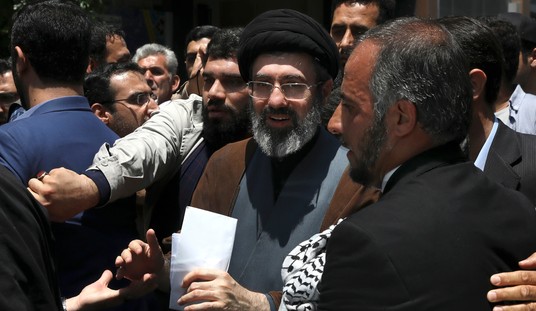Most of the focus for the presidential primaries in both parties goes to New York, the next event on the schedule and the second-largest basket of delegates in the sweepstakes. On the GOP side, the polling shows a lopsided contest, with Donald Trump trouncing Ted Cruz and gaining a majority in every survey since the beginning of March. The leftover attention after New York generally falls to California, the biggest prize, and Pennsylvania, where most delegates will be unbound at the convention anyway.
Hardly anyone has paid attention to Indiana, which holds its primary on May 3rd and has 57 Republican delegates up for grabs. Pollsters have done no work in Indiana at all, at least according to the curation at Real Clear Politics. Given its Rust Belt identity and blue-collar composition, Trump and John Kasich should both have some resonance, but Cruz may pre-empt them both if the convention goes to a second ballot. Politico’s Kyle Cheney asserts that Trump is “getting trounced,” at least in the 27 delegates chosen at the caucuses today, and almost certainly in the other 27 chosen by the state Republican committee a week later:
Indiana GOP insiders are working to engineer slates of delegates — three from each of nine congressional districts — that will turn their backs on Trump at a contested convention in July. Another 27 will be elected at a state committee meeting next week.
Indiana’s delegates will be bound to the results of the state’s May 3 primary on the first vote in Cleveland, and Trump is expected to be competitive in that contest. (There is no current public polling of the state, but several GOP leaders suggested he’d be competitive in at least a couple of the state’s nine Congressional districts.) But if Trump fails to clinch the nomination, they’ll be free to vote their conscience — and that means a rapid rejection of Trump. The state’s Republican national committeeman, John Hammond, has vocally called to reject Trump as well.
That would mark just another blow to Trump’s chances, should the convention go to a second ballot as expected. Though he’s won more votes and state primaries than rivals Ted Cruz and John Kasich, Trump has failed spectacularly to win separate delegate selection battles to his better-organized rivals. Though in most cases, he’s lost because of Cruz’s superior organization, Indiana appears to be a break from the norm. Most of the hostility to Trump there is homegrown.
Unclear? The primary is in effect a straw poll of Indiana voters, and delegates will be bound to that outcome on the first ballot no matter who they personally prefer. After that, delegates get to choose their own candidate. That makes delegate election in the caucuses and by committees a crucial part of organizing for victory — a crucial part that the Trump campaign has neglected until now.
And now it’s too late, at least in Indiana. The deadline to file as a candidate for the delegate slots passed on March 15th, Cheney notes, which means that Trump will have to see if he can woo any of the already-registered candidates. On top of that, the process in Indiana requires a hefty fee of $2000, which means that not too many of these will be casual first-timers but serious party activists.
In fact, some of them might be interested in other candidates than Cruz or Kasich, too:
“I am supporting the Draft Mitch Daniels for President at the convention,” said Nick Barbknecht, a candidate for alternate from the state’s 2nd District, who is also the district GOP vice chairman. Dunn and John agreed that they’d support a Daniels candidacy if it emerged.
Er … good luck on that idea. Another governor might have a little more impact on the popular vote, however:
Gov. Mike Pence revealed Friday that he’s been contacted by representatives of the three Republican presidential candidates as a prelude to possible endorsement ahead of Indiana’s May 3 primary election.
Pence so far is remaining mum on whether he favors former Gary casino owner Donald Trump, U.S. Sen. Ted Cruz, R-Texas, or Ohio Gov. John Kasich for the GOP nomination, but said he may announce his choice in the weeks ahead.
“I haven’t ruled it out,” Pence said.
The first-term Republican, who is running unopposed next month for the GOP gubernatorial nomination, seemed excited that Indiana actually could matter in this year’s presidential primaries for Republicans and Democrats.
“That hasn’t happened too often in my lifetime, and frankly I think it’s going to be great for Hoosiers and it’s going to be even better for these candidates because Hoosiers are people with strong hearts and strong opinions,” Pence said.
All three candidates will lobby heavily for Pence’s endorsement. If Trump doesn’t get it, we’ll see soon enough whether he learned from his Wisconsin debacle, or whether he lashes out at the still-popular Republican governor. Kasich would seem the most likely candidate for Pence’s imprimatur; they’re both governors, both work in Rust Belt electorates with similar challenges, and both served in Congress, although their tenures did not overlap (Kasich left after the 2000 election that put Pence in the House). However, Cruz has more momentum and better organization, and Pence might not want his endorsement to have no impact on the outcome as it might with Kasich — especially since Kasich performed so badly in Wisconsin, another similarly-situated state.
If Cruz can convince Pence to endorse him, then the primary vote may make the second-ballot delegate considerations moot.








Join the conversation as a VIP Member